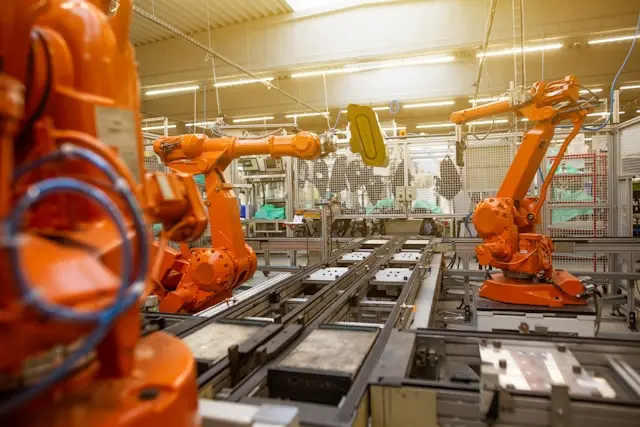Order Processing Automation: Empowering Retail Businesses with Efficiency and Accuracy
In the fast-paced world of retail, Order Processing Automation is a game-changer. With the increasing volume of online orders, retailers face challenges in managing the complexities of order processing, leading to potential errors and delays. Order Processing Automation using Python, AI, and cloud-based solutions offers a transformative approach to streamline this process, enhancing efficiency, accuracy, and customer satisfaction.
Order Processing Automation empowers retailers to automate repetitive and time-consuming tasks, freeing up human resources to focus on higher-value activities. By leveraging the power of Python, AI, and cloud computing, retailers can create intelligent systems that automate order processing end-to-end, from receiving orders to generating invoices and notifying warehouses for shipment. This not only reduces operational costs but also minimizes errors and ensures timely order fulfillment, leading to increased customer satisfaction and loyalty.

Python, AI, and Cloud: The Cornerstones of Order Processing Automation
Python, AI, and cloud technologies play a pivotal role in Order Processing Automation, empowering retailers with unparalleled capabilities.
Python: The Foundation for Unattended and Attended Bots
Python’s versatility and ease of use make it an ideal choice for developing both unattended and attended bots for Order Processing Automation. Unattended bots can automate repetitive tasks such as order entry, inventory management, and invoice generation, freeing up human resources for more strategic initiatives. Attended bots, on the other hand, can assist human workers with tasks that require human judgment or interaction with external systems. Python’s extensive library of pre-built modules and its ability to seamlessly integrate with other technologies make it a powerful tool for building customized bots tailored to specific business needs.
Cloud Platforms: Orchestrating Automation at Scale
Cloud platforms offer a comprehensive suite of features and capabilities that far surpass traditional RPA/workflow tools. These platforms provide a scalable and cost-effective environment for deploying and managing Order Processing Automation solutions. They offer features such as:
- Centralized orchestration and monitoring of automation processes
- Built-in security and compliance measures
- Advanced analytics and reporting capabilities
By leveraging cloud platforms, retailers can gain a holistic view of their Order Processing Automation initiatives, ensuring seamless integration with other business systems and data sources.
AI: Enhancing Accuracy and Handling Edge Cases
AI technologies, such as image recognition, natural language processing (NLP), and Generative AI, can significantly enhance the accuracy and efficiency of Order Processing Automation. These technologies can:
- Automate complex tasks that require human-like decision-making
- Handle edge cases and exceptions that traditional automation rules may miss
- Improve data accuracy by extracting and validating information from unstructured sources such as images and documents
By incorporating AI into their Order Processing Automation solutions, retailers can achieve higher levels of automation, reduce errors, and improve overall operational efficiency.

Building the Order Processing Automation with Python and Cloud
Order Processing Automation involves a series of interconnected subprocesses, each of which can be automated using Python and cloud technologies. The key subprocesses include:
- Receiving and Validating Orders: Python scripts can be used to connect to e-commerce platforms and retrieve new orders. Cloud-based data validation services can be employed to verify customer information, payment details, and product availability.
- Updating Inventory: Python can interface with inventory management systems to update stock levels in real-time, ensuring accurate inventory counts and preventing overselling.
- Generating Invoices: Python scripts can generate invoices based on order details and tax calculations. These invoices can be automatically sent to customers via email or other channels.
- Notifying Warehouse for Shipment: Python can trigger notifications to warehouse management systems or logistics providers to initiate the shipment process. This ensures timely order fulfillment and accurate tracking.
Data Security and Compliance in Retail
Data security and compliance are paramount in the retail industry. Python and cloud platforms offer robust security features to protect sensitive customer data, including:
- Encryption at rest and in transit
- Role-based access controls
- Audit trails and logging
Python vs. No-Code RPA/Workflow Tools
While no-code RPA/workflow tools offer a low-code/no-code approach to automation, they often lack the flexibility and customization capabilities of Python. Python’s open-source nature and extensive library of modules allow for tailored solutions that can handle complex business logic and integrate with diverse systems.
Algorythum’s Approach to Order Processing Automation
Algorythum takes a Python-based approach to Order Processing Automation due to its superior capabilities compared to off-the-shelf RPA tools. Our approach offers:
- Customization: Python allows for highly customized automation solutions that can be tailored to specific business requirements.
- Scalability: Python-based automations can be easily scaled to handle high volumes of orders and complex business processes.
- Integration: Python seamlessly integrates with a wide range of systems and data sources, ensuring end-to-end automation.
By leveraging Python and cloud technologies, Algorythum empowers retailers to achieve unparalleled efficiency, accuracy, and compliance in their Order Processing Automation initiatives.

The Future of Order Processing Automation
The future of Order Processing Automation holds exciting possibilities for retailers looking to further enhance their operational efficiency and customer satisfaction.
One key area of growth is the integration of Artificial Intelligence (AI) and Machine Learning (ML) technologies. AI-powered automation can handle complex tasks that require human-like decision-making, such as fraud detection and personalized product recommendations. ML algorithms can continuously learn from data and improve the accuracy and efficiency of automation processes.
Another emerging trend is the adoption of Blockchain technology for secure and transparent order tracking. Blockchain can provide a tamper-proof record of all transactions, ensuring trust and accountability throughout the supply chain.
Subscribe and Contact Us
To stay abreast of the latest advancements in Order Processing Automation and other industry-specific automation solutions, we encourage you to subscribe to our newsletter.
For businesses seeking to implement custom Order Processing Automation solutions tailored to their specific requirements, we invite you to contact our team. We offer free feasibility assessments and cost estimates to help you determine the best approach for your organization.
Together, let’s unlock the full potential of Order Processing Automation and drive your retail business to new heights of efficiency and customer satisfaction.

Algorythum – Your Partner in Automations and Beyond
At Algorythum, we specialize in crafting custom RPA solutions with Python, specifically tailored to your industry. We break free from the limitations of off-the-shelf tools, offering:
- A team of Automation & DevSecOps Experts: Deeply experienced in building scalable and efficient automation solutions for various businesses in all industries.
- Reduced Automation Maintenance Costs: Our code is clear, maintainable, and minimizes future upkeep expenses (up to 90% reduction compared to platforms).
- Future-Proof Solutions: You own the code, ensuring flexibility and adaptability as your processes and regulations evolve.









